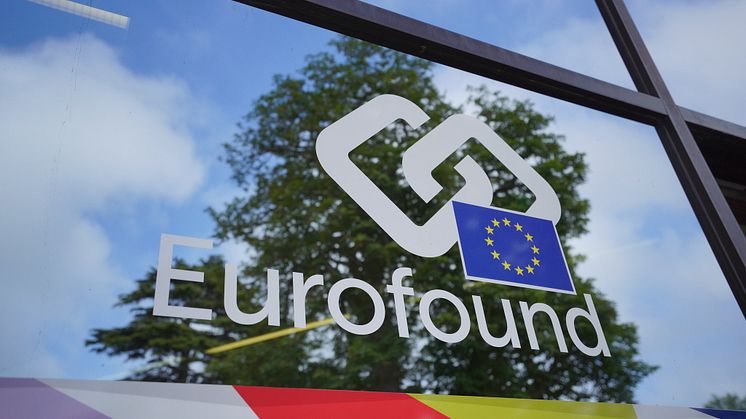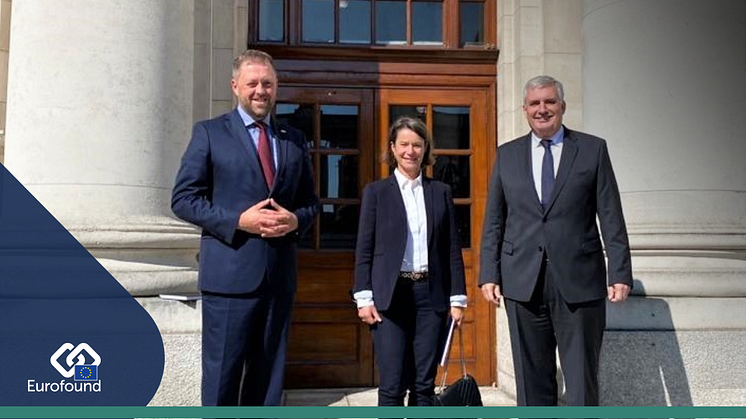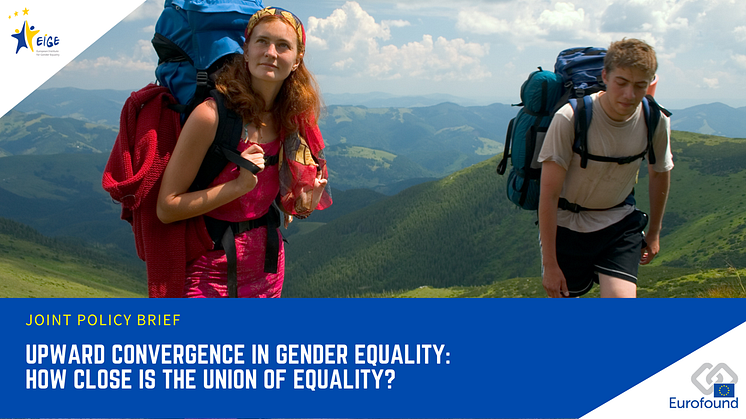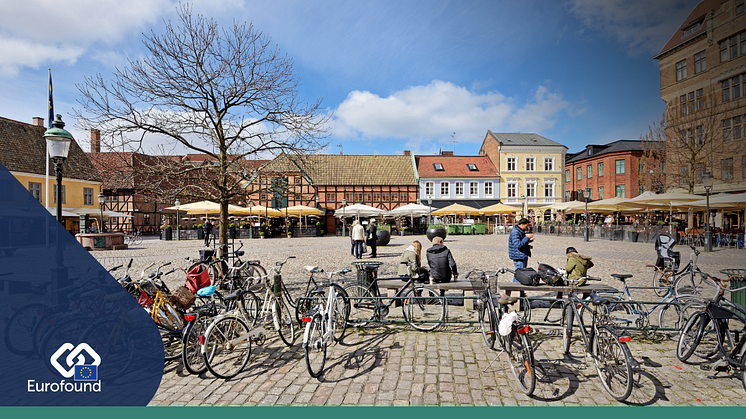COVID-19 one year on: A changed Europe
The outbreak of COVID-19 in Europe may be moving gradually into history, but the long-term impacts of the pandemic on our work and lives is just beginning.

The outbreak of COVID-19 in Europe may be moving gradually into history, but the long-term impacts of the pandemic on our work and lives is just beginning.

Eurofound, in cooperation with the Embassy of the Republic of Slovenia in Ireland (in the framework of the Presidency of the Council of the European Union), will host a meeting of the EU Heads of Missions in Ireland on Tuesday 28 September.

Eurofound’s Directorate met with Thomas Byrne T.D., Minister of State with responsibility for EU Affairs, in Dublin today to discuss the evolving role of the Agency in producing timely and relevant research on the implications of the COVID-19 pandemic on employment, the labour market and quality of life, as well as its strategic position as the only EU agency based in Ireland.

The shift to telework during the pandemic, and increased demand for more hybrid working arrangements in the future, is putting the spotlight on whether existing labour legislation is fit for purpose in post-pandemic Europe, according to Eurofound’s new report Right to disconnect: Exploring company practices.

As Europe moves to the final stages of its initial vaccination programme, workers are now returning to offices and other places of work, and citizens in general are reengaging into the community. Eurofound will be releasing important new research this autumn investigating how COVID-19 has impacted our lives and what these changes mean for Europe.

More than 9 out of 10 establishments with 10 or more employees in Slovakia report difficulties in finding suitable candidates for open positions, according to a recent Eurofound report on ‘Tackling labour shortages in EU Member States’. This is the highest proportion in the EU, followed by Romania (90%) and Malta (88%), while rates are lowest in Denmark and Greece (both 57%).

In spring 2021, around 5% of people in Belgium, who had been employed before the pandemic, reported having lost their job. Compared to the EU average of 10%, Belgium fares comparatively well, with only neighbouring Luxembourg and the Netherlands reporting lower figures, according to Eurofound’s large-scale Living, working and COVID-19 online survey.

Following the declines in employment rates and working hours across Europe in 2020,i economies began to show signs of recovery during the first quarter of 2021. The gradual rekindling of economic activity has led to a surge in demand for workers and reawakened concerns over labour shortages.

The social and economic impacts of the COVID-19 crisis threaten to roll back recent progress in gender equality, including an overall trend of upward convergence.

Fewer than 50% of people in France are likely to take the COVID-19 vaccination, according to Eurofound’s large-scale Living, working and COVID-19 online survey. In February and March 2021, just 48.7% replied that they were likely or very likely to get vaccinated against the COVID-19 virus when it becomes available to them. This is considerably lower than the EU average at 64.4%.

As we leave behind the lockdowns and business disruptions of COVID-19 and enter a ‘new normal’, it is time to talk about how workplaces might be transformed to drive innovation.

Slovenians have fared comparatively well in terms of mental health during the COVID-19 pandemic compared to their EU counterparts standing at 53.2 on a scale of 100, behind only Denmark and Finland. According to Eurofound’s large-scale Living, working and COVID-19 online survey, the EU average was 45.3 in spring 2021.

74% of people in Croatia report difficulties making ends meet, according to Eurofound’s large-scale Living, working and COVID-19 online survey. This is the highest figure among EU Member States, where the average was 45.1%. For Croatia, this number remained consistently high throughout the pandemic at 73.5% in April 2020 reporting a difficult personal financial situation.

The financial situation of people in Luxembourg is significantly better than the EU average with 11.3% of respondents reporting difficulties in making ends meet in February and March 2021, according to Eurofound’s large-scale Living, working and COVID-19 online survey. This is the third lowest figure among EU Member States with the EU average at 23.6%, just behind Denmark and Sweden.

Are there any lessons to be learnt about the factors that helped some organisations to navigate through the crisis more smoothly than others?

Decision-makers approached minimum wage setting for 2021 cautiously due to the economic uncertainty caused by the pandemic. Despite this, nominal statutory minimum wages rose in most Member States and the UK, although at lower rates than in recent years.

Throughout the COVID-19 pandemic, trust of people in Sweden in their national government has declined from 6.4 to 5.1. Respondents rated their trust levels at the onset of the pandemic (data collection April 2020) at 6.4 on average, which decreased to 5.5 during the summer months of last year and then to 5.1 in February and March of this year.

Trust in the national government in Denmark ranked highest among EU countries at 7 out of 10, according to Eurofound’s large-scale Living, working and COVID-19 online survey. This marked an increase of 0.5 points compared to the summer of last year. This pattern goes against the trend observed in all other EU Member States, where the average trust rating fell to just 3.9 from 4.6.

Pessimism about one’s future financial situation has decreased in Italy compared to summer 2020, according to Eurofound’s large-scale Living, working and COVID-19 online survey. In February 2021, over one fifth (22.5%) of people in Italy expected a worsening of their situation compared to 27.6% in June/July of last year.

Now that the pandemic is receding and wholesale telework seems to be here to stay, governments are faced with the need to properly regulate such arrangements. Member States are following different paths, but the EU might step in to promote some level of standardisation.
